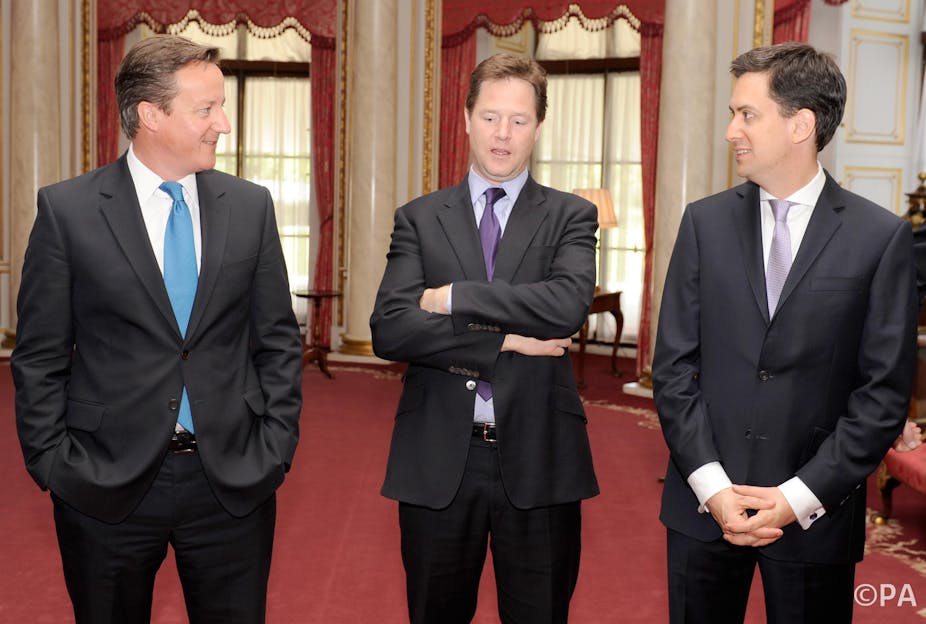After weeks of wrangling, British broadcasters have finally agreed on the format for the TV debates to be aired ahead of the May election. But what has emerged looks something like a table plan for a dysfunctional family gathering. Most of the guests would much rather sit on their own in the car park than have to sit next to the others.
Voters might not have been demonstrating in the streets to demand that the televised debates happen, but they can tell when they’ve been offered a duff package and will draw their own conclusions about what this fiasco says about the extent to which politicians respect them.
Televised election debates don’t change most people’s voting intentions but they have been shown to have important effects upon precisely that minority of the public whose votes will determine the election outcome. Undecided citizens who are unlikely to vote unless they encounter information that stimulates them and people with weak allegiances to a particular party who might see in the debates a reason to shift their preference are particularly good targets. So too are people who have had minimal exposure to the range of parties on offer until they see them in debate and, increasingly, people thinking of voting tactically in the hope of electing a least worst government.
Debates matter because they reach those people that traditional campaigns rarely touch. But looking at the four formats that have emerged from the tortuous negotiations you have to wonder how well democracy will be served.
First up will be a Sky and Channel 4 show on March 26. Jeremy Paxman will interview David Cameron and Ed Miliband in front of a studio audience – but not in a head-to-head debate. Each will appear separately in an interview that will resemble BBC Newsnight circa 1997.
We can easily predict how this will play out. The two leaders will sound like telephone answering machines responding to an angry caller who imagines that there’s a real person at the other end. Paxman will perform as the embodiment of a permanent Opposition, with audience members serving as his loyal backbenchers.
This will not be a debate. At best, it will offer Cameron and Miliband some valuable sparring time in preparation for the real event the following Thursday.

On April 2, ITV will host a live two-hour debate. This will bring together the leaders of the Conservatives, Labour, Liberal Democrats, UKIP, Greens, SNP and Plaid Cymru.
Critics have suggested that a debate with seven participants will be shambolic and confusing to viewers. Of course, this could become a shouting match or – worse still – an opportunity for hijacking by whichever leader comes across as the most flamboyantly populist.
But it’s a two-hour debate – a full 30 minutes longer than the ones that took place in 2010. With intelligent moderation, this could be turned into a real opportunity to interrogate ideas and policies rather than leave viewers bamboozled by rhetorical strategies.
Most serious commentators predict that this election will result in a minority government or coalition, so having a chance to reflect on the preferable permutations will be a bonus for voters rather than a distraction. Of all the formats on offer to the electorate this year, this is the one that is most likely to make a difference.
Two weeks later, on April 16, the BBC is running a debate involving what it is calling “the challenger parties”. Labour, UKIP, the SNP, Plaid Cymru and the Greens will go head to head.
The most peculiar feature of this final debate is the exclusion of Liberal Democrat leader, Nick Clegg. Rumours abound that Clegg’s exclusion was a dealbreaker for the Conservatives, who didn’t want him to be seen as speaking for the government. The Conservatives say that it was the broadcasters’ decision not to invite Clegg. Whatever the truth, the Liberal Democrats are paying the price yet again for having entered into a coalition with the Conservatives. In this final debate, Miliband will appear as a rather anomalous figure alongside a group of party leaders who cannot hope to lead a government after May 7.
For those in search of even more debate – or, indeed, actual debate -– there will be a BBC Question Time special on April 30. This will feature Cameron, Miliband and Clegg taking questions from a studio audience.
Perhaps the leaders will bump into one another in the green room as they prepare to make their separate entrances; perhaps they will exchange some penetrating critiques of their rivals’ policies; but the millions of people who will cast their votes the following week won’t ever hear any of this.
That is precisely why voters deserve an open leaders’ debate rather than a series of consecutive interviews. Justified by the claim that debates suck the life out of elections, we have ended up with a mish-mash of compromised formats. The impact of this might not be upon who wins, but how many bother to vote.

